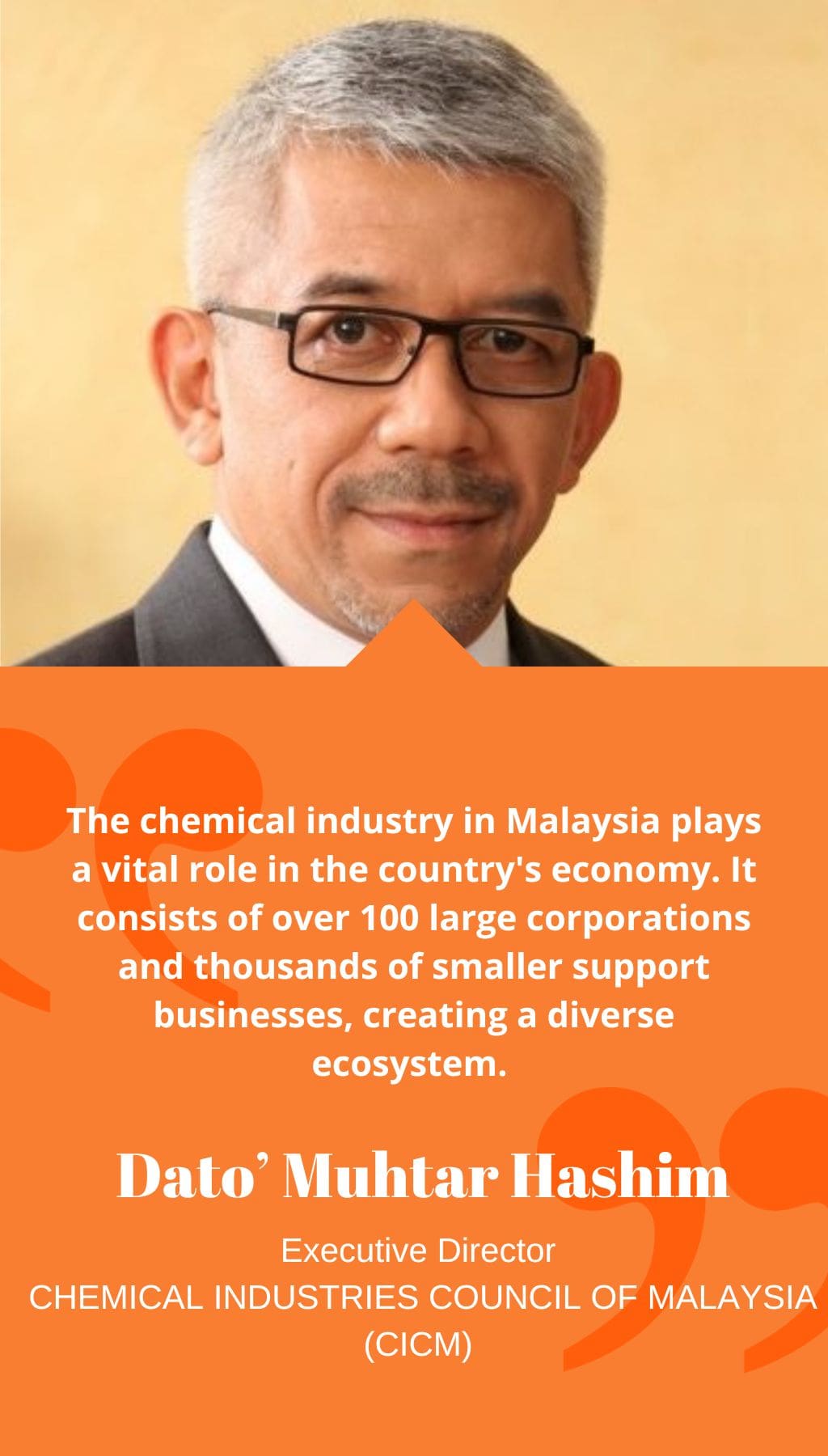
- Malaysia | 25 April 2023

Can you provide an introduction to CICM for our international audience?
Certainly! CICM (Chemical Industries Council of Malaysia) was established 40 years ago and currently has a membership of 115 companies. Half of the members are categorized as ordinary members, consisting of manufacturers, while the other half are associate members, comprising service providers to the chemical sector such as logistics, warehousing, and consultants. At an organizational level, CICM is divided into different committees that focus on four core activities: Responsible Care, Regulatory Affairs, Safe Road, and Business Support & Development. The Responsible Care committee holds a flagship role as the custodian of the Responsible Care initiative in Malaysia. The Regulatory Affairs Committee oversees compliance matters and acts as a liaison between members, government agencies, and regulatory bodies. The Business Support and Development Committee facilitates networking and collaboration opportunities for members, while the Safe Road Committee provides guidance on the safe handling and transportation of chemicals. CICM conducts various activities, including the yearly Responsible Care Run, seminars, webinars, the Responsible Care Awards, and the Chemical Industry Dinner, to promote awareness about the industry.
How significant is the chemical industry to Malaysia’s economy?
The chemical industry in Malaysia plays a vital role in the country’s economy. It consists of over 100 large corporations and thousands of smaller support businesses, creating a diverse ecosystem. As the third largest export earner, after electronics and petroleum products, the industry contributes significantly to Malaysia’s economy. In 2021, chemicals accounted for 5.7% of total export proceeds, equivalent to US$16.7 billion. The chemical industry’s history in Malaysia traces back 50 years when small fertilizer companies emerged from the country’s large agriculture sector. Over time, the industry expanded to include the production of basic downstream chemicals such as methanol and ethanol. Major petrochemical plants were built around 35-40 years ago, producing ammonia, ethylene, propylene, polymers, and aromatics. The industry also grew in East Malaysia and the east coast of the peninsula, leveraging the availability of natural gas. Recently, a special petrochemical complex was developed in Johor to encourage the production of downstream specialty chemicals, creating an integrated refinery and petrochemical hub. In 2021, the Malaysian chemical sector attracted US$1.3 billion in investment, and the government is actively seeking further investment opportunities.
What makes Malaysia an attractive investment destination for chemical players?
Malaysia’s geographical position makes it a strategic base for production and storage in the chemical industry. Locations such as Pengerang, at the southern tip of Peninsula Malaysia, offer ample storage capacity. The country’s infrastructure is well-developed, with deep ports, airports, and specialized LNG terminals in Bintulu, Pengerang, Melaka, and other key areas. Additionally, Malaysia benefits from abundant natural resources, which further adds to its attractiveness as an investment destination. Stability is another advantage, as Malaysia is known for its political and economic stability. The government has implemented various incentives to attract foreign investors and skilled foreign workers, creating a conducive environment for chemical players.
How is Malaysia recovering after the pandemic?
Malaysia has made significant progress in reducing the number of COVID-19 cases. However, precautionary restrictions are still in place, and many people continue to work from home as the country navigates through a transitional phase. The chemical industry, like many others, is adapting to new ways of working and adjusting to the changes brought about by the pandemic.
What are some of the key challenges the industry faces?
Logistics has emerged as a significant challenge for many members of the chemical industry. The regulatory environment for logistics companies has undergone drastic changes, driven by customer demands for compliance with carbon emission requirements and sustainable packaging to reduce plastic waste. Furthermore, the advent of technologies such as AI, digitalization, and 5G has increased pressure on companies to enhance competitiveness. Global geopolitical issues also have an impact on the Malaysian marketplace, as seen with the current conflict in Ukraine, which has led to increased prices of crude oil and palm oil. This poses severe challenges for many manufacturing units, although it may also create short-term opportunities for others.
Do you have a final message?
I invite chemical players to explore the opportunities in Malaysia. It is advisable to engage with industry professionals, consult CICM, and interact with our government agencies to gain a firsthand understanding of what the country offers. The government is committed to facilitating the growth of the chemical industry, but we need partners who can bring expertise and new technologies to further develop the industry in Malaysia.














